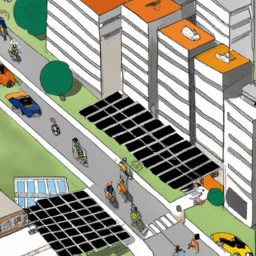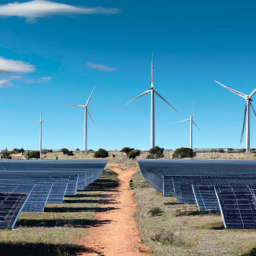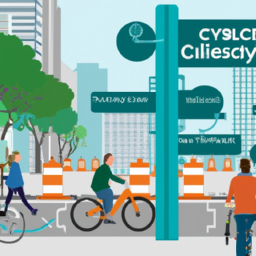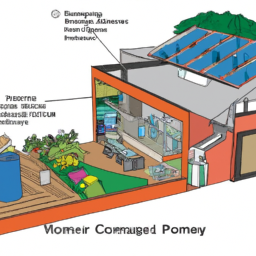Are you tired of feeling helpless in the face of climate change? Want to make a difference but don’t know where to start? Look no further! The Ultimate Guide to Sustainable Living: Tips for a Greener Future is here to help. Imagine a world where every action you take contributes to a healthier planet. This comprehensive guide will show you how to reduce your carbon footprint, embrace renewable energy, adopt sustainable transportation options, and make eco-friendly choices in your everyday life. Together, we can create a greener future for all.
Key Takeaways
- Sustainable living directly impacts the health of the planet and future generations.
- Cutting down on energy consumption decreases your carbon footprint.
- Renewable energy sources offer a cleaner and more sustainable alternative to fossil fuels.
- Electric vehicles (EVs) are a greener transportation option.
Why Sustainable Living Matters

Sustainable living matters because it directly impacts the health of our planet and future generations. By understanding the importance of conservation and implementing sustainable agriculture practices, we can make a significant positive impact on the environment.
Conservation plays a crucial role in sustainable living. It involves using resources wisely, reducing waste, and preserving natural habitats. Conserving energy is one way to contribute to sustainability. Simple actions like turning off lights when not in use or unplugging electronics can significantly reduce energy consumption. Additionally, water conservation is vital for sustainable living. Fixing leaky faucets, using water-efficient appliances, and collecting rainwater for irrigation are effective strategies.
Another key aspect of sustainable living is adopting sustainable agriculture practices. This approach focuses on environmentally friendly farming methods that minimize harm to ecosystems while ensuring food security for future generations. Sustainable agriculture emphasizes organic farming techniques, crop rotation, and reducing chemical usage. It also promotes biodiversity by preserving native species and protecting pollinators such as bees.
Overall, practicing sustainable living through conservation efforts and embracing sustainable agriculture practices is essential for safeguarding our planet’s health and securing a greener future for generations to come. By making conscious choices in our daily lives, we can all contribute towards creating a more sustainable world.
Reducing Your Carbon Footprint

By cutting down on energy consumption, you can significantly decrease your carbon footprint. One effective way to achieve this is by practicing carbon offsetting. Carbon offsetting involves investing in projects that reduce or remove greenhouse gas emissions to compensate for your own emissions. This can be done through activities like planting trees, supporting renewable energy projects, or investing in sustainable transportation options.
Another powerful way to reduce your carbon footprint is by adopting a sustainable diet. The food we consume has a significant impact on the environment, especially when it comes to greenhouse gas emissions. By choosing locally sourced and organic foods, as well as reducing meat and dairy consumption, you can greatly reduce the environmental impact of your diet.
In addition to these strategies, there are other simple steps you can take to minimize your carbon footprint. Use energy-efficient appliances and light bulbs at home, turn off lights when not in use, unplug electronic devices when they are fully charged, and consider using public transportation or carpooling instead of driving alone.
Remember that every small action adds up and contributes positively towards a greener future. By implementing these changes in your daily life, you can make a significant difference in reducing your carbon footprint and creating a more sustainable world for future generations.
The Benefits of Renewable Energy

Renewable energy sources, such as solar and wind power, offer you a cleaner and more sustainable alternative to fossil fuels. By harnessing the power of the sun and wind, these energy sources have numerous advantages and can have a significant impact on our planet.
One of the most significant advantages of renewable energy is its environmental impact. Unlike fossil fuels, which release harmful greenhouse gases when burned for electricity generation, renewable energy sources produce little to no emissions. This means that by using solar panels or wind turbines to generate electricity, you can help reduce air pollution and combat climate change.
Another advantage is their abundance. The sun provides an infinite supply of energy, while wind is a constantly available resource in many parts of the world. As long as the sun shines and the wind blows, you’ll always have access to clean energy.
Furthermore, investing in renewable energy can lead to economic benefits. It creates jobs in industries like solar panel manufacturing and installation, boosting local economies. Additionally, by reducing our reliance on imported fossil fuels, we can increase energy independence.
Sustainable Transportation Options

Electric vehicles, or EVs, are becoming increasingly popular as a greener transportation option. If you’re considering sustainable transportation options, investing in an electric vehicle might be worth considering. Not only do electric vehicles produce zero emissions while driving, but they also offer several other benefits. One major advantage is the lower operating costs compared to traditional gasoline-powered cars. Electric vehicles generally require less maintenance and have lower fuel costs since electricity is cheaper than gasoline.
Additionally, electric vehicles contribute to reducing air pollution and greenhouse gas emissions that harm the environment. By choosing an electric vehicle, you can actively participate in mitigating climate change and promoting cleaner air quality for yourself and future generations.
While public transportation is often seen as another sustainable option for getting around, owning an electric vehicle provides added convenience and flexibility. With a personal EV, you have the freedom to travel whenever and wherever you want without relying on fixed schedules or routes of public transport systems.
When it comes to charging your electric vehicle, there are various options available to suit your needs. Public charging stations are becoming more prevalent in many cities, allowing you to charge your car while running errands or during longer trips.
Tips for Eco-Friendly Home Practices

If you’re looking to make your home more eco-friendly, there are simple practices you can incorporate into your daily routine. One way to reduce waste and have a positive impact on the environment is by adopting a zero waste lifestyle. This means striving to minimize the amount of trash you produce by recycling, composting, and using reusable items like cloth bags and stainless steel water bottles.
Another important aspect of an eco-friendly home is using energy efficient appliances. By replacing old, energy-guzzling appliances with newer models that have high energy efficiency ratings, you can significantly reduce your household’s carbon footprint. Look for appliances with the ENERGY STAR label, which indicates that they meet strict standards for energy efficiency set by the U.S. Environmental Protection Agency.
In addition to these practices, it’s important to be mindful of your water usage. Simple habits like turning off the faucet while brushing your teeth or installing low-flow showerheads can help conserve water and reduce your utility bills.
Sustainable Shopping and Consumer Choices

When it comes to sustainable shopping and consumer choices, you can make a difference by being mindful of the products you purchase and their impact on the environment. One way to do this is by opting for eco-conscious fashion. Look for clothing brands that prioritize sustainability by using organic materials, practicing fair trade, and minimizing waste in their production processes. Consider buying second-hand or vintage clothing as well, as this helps reduce the demand for new garments and extends the lifespan of existing ones.
Another area where you can make a positive impact is through ethical food choices. Support local farmers who use sustainable farming practices such as organic, regenerative, or permaculture methods. Choose foods that are in season to reduce carbon emissions associated with long-distance transportation. Reduce your consumption of animal products by incorporating more plant-based meals into your diet. This not only benefits the environment but also promotes better animal welfare.
Being mindful of our shopping habits and consumer choices is crucial in creating a greener future. By supporting eco-conscious fashion and making ethical food choices, we contribute towards reducing our ecological footprint and preserving the planet for future generations. Remember, every small step counts!
Frequently Asked Questions
What Are Some Easy Ways to Incorporate Sustainable Living Into My Daily Routine?
Looking to incorporate sustainable living into your daily routine? There are easy ways to reduce waste and incorporate sustainable practices in the workplace. Start by reducing single-use items like plastic bags and water bottles. Opt for reusable alternatives instead. Also, consider composting food scraps and recycling properly. When it comes to the workplace, encourage energy-saving habits such as turning off lights when not in use or using natural lighting whenever possible. These simple changes can make a big difference in creating a greener future.
How Can I Encourage My Friends and Family to Adopt Sustainable Practices Without Sounding Preachy?
How can you inspire your friends and family to adopt sustainable practices without sounding preachy? Effective communication is key when promoting sustainable living. Start by leading by example and incorporating sustainable habits into your own life. Share personal stories and experiences that highlight the benefits of sustainable living, rather than lecturing or criticizing others. Use positive language and focus on practical solutions that everyone can easily implement. By approaching the topic with empathy and understanding, you can encourage others to join you on the path towards a greener future.
Are There Any Tax Incentives or Financial Benefits Associated With Sustainable Living?
Tax incentives and financial benefits can be associated with sustainable living. By adopting sustainable practices, you may qualify for tax credits or deductions that can lower your overall tax liability. Additionally, investing in energy-efficient upgrades like solar panels or energy-saving appliances can lead to long-term cost savings on utility bills. It’s important to research and understand the specific incentives available in your area as they vary by location. Taking advantage of these opportunities can help you save money while contributing to a greener future.
What Are Some Common Misconceptions About Renewable Energy That People Should Be Aware Of?
When it comes to renewable energy, there are a few common misconceptions that people should be aware of. One is that renewable energy is too expensive and not cost-effective. However, the reality is that over time, the costs of renewable energy have been decreasing significantly. Another misconception is that renewable energy does not contribute to the economy. In fact, investing in renewable energy can create jobs and stimulate economic growth. Understanding these misunderstandings will help you make informed decisions about sustainable living.
How Can I Find Sustainable Products and Services in My Local Area?
To find sustainable products and services in your local area, there are several tips and resources you can use. Start by supporting local businesses that prioritize sustainability. Look for certifications like Fair Trade or organic labels on products. Visit farmers markets or community-supported agriculture programs for fresh, locally sourced food. Use online directories or apps that specialize in connecting consumers with eco-friendly businesses. By taking these steps, you can make a positive impact on the environment while supporting your local economy.
Conclusion
In conclusion, embracing sustainable living is crucial for a greener future. By reducing your carbon footprint through simple changes in your daily life, such as conserving energy and water, you can make a significant impact on the environment. While some may argue that sustainable choices are more expensive, remember that investing in renewable energy and eco-friendly products will ultimately save you money in the long run. So, let’s take action now and pave the way for a healthier planet for generations to come!